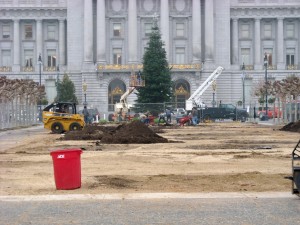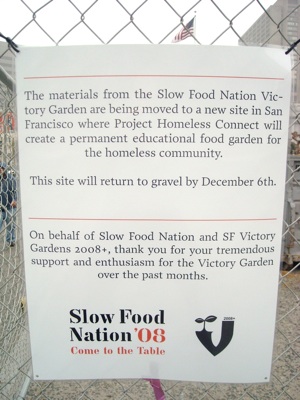The title says it all: 25 low-cost, maximum-impact tips for a green 2009, from the San Francisco Chronicle.
sustainability
I just came across Garden for the Environment, a San Francisco group that maintains a demonstration garden in SF and offers classes on gardening, composting and other topics:
Garden for the Environment maintains a nationally acclaimed one-acre urban demonstration garden and offers environmental education programs about organic gardening, urban compost systems and sustainable food systems. Since its founding in 1990, the garden has operated as a demonstration site for small-scale urban ecological food production, organic gardening and low water-use landscaping.
I’ve always wanted to learn some gardening basics (it’s been a long time since I grew vegetables behind my Dad’s flat when I was a kid), so this is definitely on my list of things to check out.
From the New York Times:
DARMSTADT, Germany “” From the outside, there is nothing unusual about the stylish new gray and orange row houses in the Kranichstein District, with wreaths on the doors and Christmas lights twinkling through a freezing drizzle. But these houses are part of a revolution in building design: There are no drafts, no cold tile floors, no snuggling under blankets until the furnace kicks in. There is, in fact, no furnace.
In Berthold Kaufmann”™s home, there is, to be fair, one radiator for emergency backup in the living room “” but it is not in use. Even on the coldest nights in central Germany, Mr. Kaufmann”™s new “passive house” and others of this design get all the heat and hot water they need from the amount of energy that would be needed to run a hair dryer.
From the Chronicle:
The cooks of San Francisco, where sauteing is a sacred rite for some, now have a place to send their used cooking oil without turning the city’s sewer system into a choked maze of congealed grease.
On Saturday, the city kicked off a four-day cooking oil recycling drive, during which residents can drop off their discarded olive oil, canola oil and other kitchen grease for eventual use in the city’s fleet of biofuel vehicles. At the last grease recycling drive, over Thanksgiving weekend, San Franciscans unloaded more than 2 tons of cooking oil.
From Trees Have Rights Too:
This year marks the 60th anniversary of the Universal Declaration of Human Rights. Time now to address Planetary Rights.
Just as the humanitarian crisis of the Second World War gave birth to the Universal Declaration of Human Rights 60 years ago in 1948, so now we have a planetary crisis that needs to be addressed with equal urgency. Now is the time to call for a Universal Declaration of Planetary Rights.
What happens next is up to us. Our future can be a world where we live in harmony with nature. Our planet is in crisis, and the United Nations are uniquely placed to implement the necessary foundations to create a new world where prevention and protection stand hand in hand.
Trees Have Rights Too is a campaign to encourage the United Nations to take this bold and vitally important step. I hope you will join us in our journey to create our new harmonious interconnected world.
The San Francisco Department of the Environment has developed a Solar Map of The City which shows existing installations and provides estimates of how much solar energy can be obtained at a given location. There are also estimates to the cost of installing solar including incentive discounts available.
The San Francisco Department of the Environment provides information and resources about a slew of environmental programs available in The City:
The San Francisco Department of the Environment (SFE) works to improve, enhance and preserve the environment, and to promote San Francisco’s long-term well-being. In addition to its historic function of providing environmental policy direction for the Mayor and Board of Supervisors, SFE delivers service programs for San Francisco residents and businesses, including recycling, toxics reduction, environmental justice grants, and renewable energy and efficiency. SFE develops innovative, practical and wide-ranging environmental programs, fosters groundbreaking legislation, and connects the public to environmental resources by providing access to comprehensive and easy-to-use information on a wide range of sustainable practices. Some of the Department’s ambitious, but deliverable, environmental goals include attaining 75 percent recycling by 2010, and curbing San Francisco’s greenhouse gas emissions to 20 percent below 1990 levels by 2012. For more information about SFE, go to http://www.sfenvironment.org.

